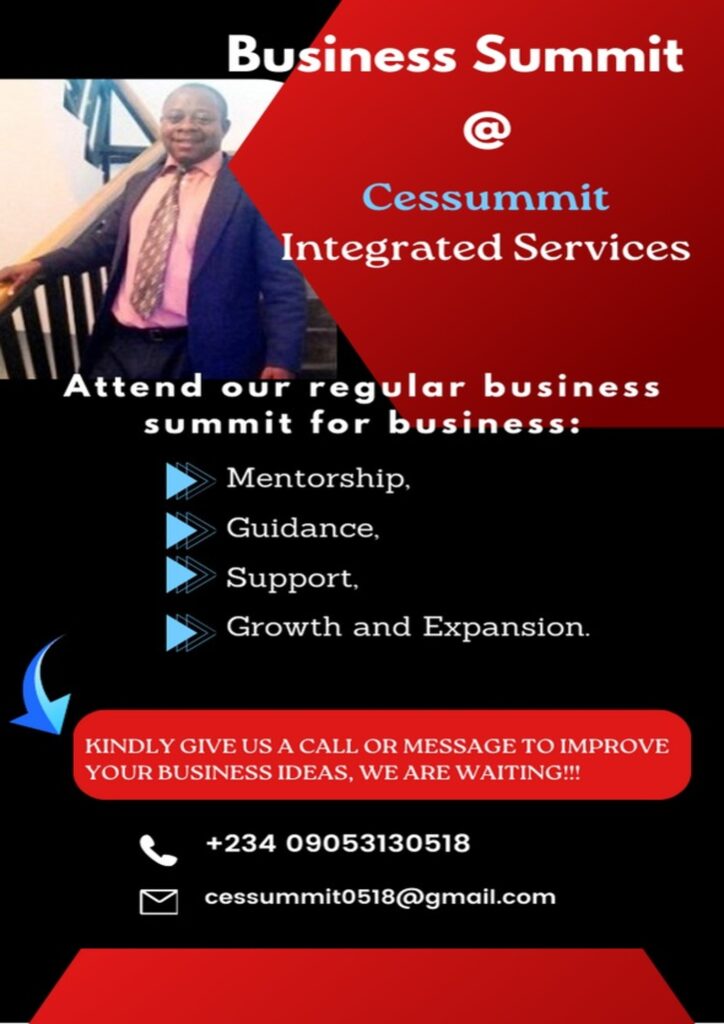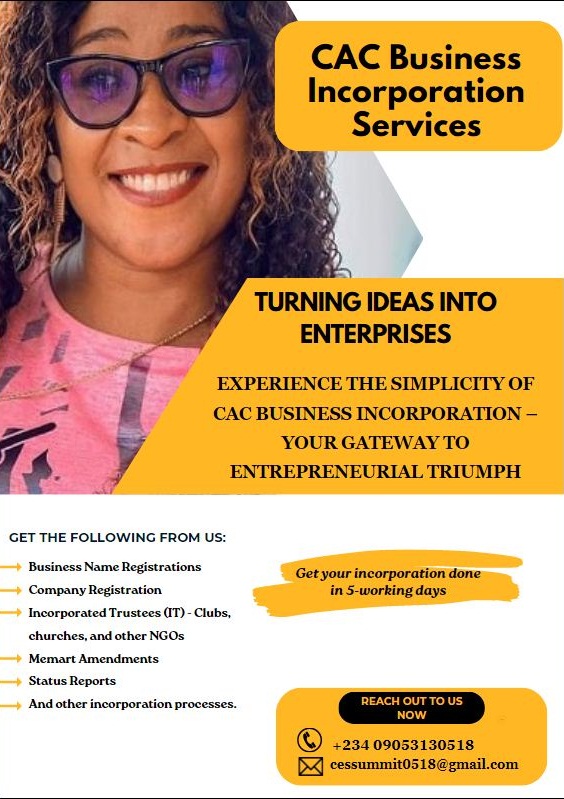
How to Start an Event Planning Business in Nigeria
How to Start an Event Planning Business in Nigeria – This article on How to Start an Event Planning Business in Nigeria is a valuable resource for various individuals and purposes. Whether you’re in need of a startup guide, preparing to apply for a loan, developing a business plan, or seeking academic exercise material, this article has you covered. It’s comprehensive information and step-by-step approach make it suitable for anyone looking to establish an event-planning business in Nigeria. With its practical insights and expert advice, this article serves as a reliable reference for aspiring entrepreneurs in the event planning industry.
So, if you have a passion for organizing and a flair for creating memorable experiences, starting an event planning business in Nigeria can be an exciting and rewarding venture. Nigeria’s vibrant and diverse culture, coupled with its thriving economy, offers a plethora of opportunities for event planners to showcase their skills. Whether it’s organizing weddings, corporate functions, or social gatherings, the demand for professional event planners is on the rise.
However, to establish a successful event planning business in Nigeria, careful planning, market research, and strategic execution are essential. In this guide, we will explore the key steps involved in starting an event planning business in Nigeria, providing you with valuable insights and practical advice to help you embark on this entrepreneurial journey with confidence.
Contents
- 1 Why Read: How to Start an Event Planning Business in Nigeria?
- 1.1 The Importance of Event Planning:
- 1.2 Conducting Market Research:
- 1.3 Developing a Business Plan:
- 1.4 Registering Your Business:
- 1.5 Setting Up Your Office:
- 1.6 Related Topics:
- 1.7 Building a Network of Suppliers and Vendors:
- 1.8 Hiring and Training Staff:
- 1.9 Developing Relationships with Clients:
- 1.10 Managing Finances: How to Start an Event Planning Business in Nigeria.
- 1.11 Marketing and Promoting Your Business:
- 1.12 Ensuring Successful Event Execution:
- 1.13 Evaluating and Improving Your Business:
- 1.14 Going Forward:
- 1.15 Event Planning Timeline:
- 1.16 Sectoral Business Plans: How to Start an Event Planning Business in Nigeria.
- 1.17 Cessummit Integrated Services Business Plan:
- 1.18 Read More: How to Start an Event Planning Business in Nigeria
- 1.19 Share this:
- 1.20 Like this:
Why Read: How to Start an Event Planning Business in Nigeria?
If you are considering starting an event planning business in Nigeria, reading this guide will provide you with valuable information and insights to kickstart your entrepreneurial journey. Here’s why you should read this article:
Comprehensive Guidance – This guide offers a step-by-step approach to starting an event planning business in Nigeria. It covers everything from initial planning to marketing strategies, giving you a comprehensive understanding of the process.
Relevant to Nigeria – Nigeria has its unique business environment and cultural landscape. This guide specifically focuses on the Nigerian market, taking into account the local customs, preferences, and challenges you may encounter. It provides insights tailored to the Nigerian context.
Market Analysis – Understanding the market is crucial for any business. This guide provides you with valuable market research, including the current demand for event planners in Nigeria, popular event types, and emerging trends. By being well-informed, you can make informed decisions to meet the needs of your target audience. This is How to Start an Event Planning Business in Nigeria.
Legal and Regulatory Considerations – Starting a business involves navigating legal and regulatory frameworks. This guide outlines the necessary licenses, permits, and registrations required to operate an event planning business in Nigeria. It helps you comply with the legal requirements and avoid potential pitfalls.
Practical Tips and Strategies – From building a strong network of vendors and suppliers to pricing your services competitively, this guide offers practical tips and strategies to help you succeed in the event planning industry. It covers aspects such as branding, client acquisition, and effective event management techniques. Read through How to Start an Event Planning Business in Nigeria.
Insights from Industry Experts – The guide incorporates insights and experiences from successful event planners and industry experts in Nigeria. Their knowledge and advice will inspire you, provide you with insider tips, and help you navigate challenges effectively. This is important for How to Start an Event Planning Business in Nigeria.
So, you can see that starting an event planning business in Nigeria can be a fulfilling and profitable venture. But you have to read through this article to know exactly what to do. Therefore, by reading this guide, you will gain the knowledge and confidence needed to launch your business successfully and stand out in a competitive market. This is How to Start an Event Planning Business in Nigeria.
The Importance of Event Planning:
The importance of event planning lies in its ability to ensure a smooth and successful event. Event planning is the process of organizing and coordinating various aspects of an event, such as conferences, weddings, corporate meetings, trade shows, and social gatherings. It involves detailed planning, budgeting, scheduling, venue selection, logistics management, vendor coordination, and overall event execution. The goal of event planning is to create memorable experiences that meet the objectives and expectations of the clients and attendees. Read through How to Start an Event Planning Business in Nigeria.
A well-executed event can have numerous benefits, including:
Achieving Objectives – Event planning helps organizations or individuals achieve their specific goals, whether it’s promoting a product, raising funds for a cause, fostering networking opportunities, or celebrating a special occasion.
This is How to Start an Event Planning Business in Nigeria. – Event planners bring their expertise to the table, ensuring that events are organized professionally and efficiently. They handle the intricate details, allowing clients to focus on their core responsibilities. This is very important for How to Start an Event Planning Business in Nigeria.
Creative and Memorable Experiences – Event planners have the skills to create unique and engaging experiences that leave a lasting impression on attendees. From thematic concepts to interactive activities, they enhance the overall event atmosphere.
Budget Management – Event planners are adept at working within allocated budgets, optimizing resources, and negotiating with vendors to minimize costs while delivering a high-quality event. This is important for How to Start an Event Planning Business in Nigeria.
Time and Stress Management – Planning an event requires significant time and effort. Event planners alleviate the stress by managing the logistics, timelines, and potential challenges, allowing clients to enjoy the event without distractions.
Overview of the Event Planning Industry in Nigeria:
The event planning industry in Nigeria has experienced significant growth over the years. Nigeria, being a country with diverse cultural celebrations and a thriving business environment, offers ample opportunities for event planners. From weddings and birthdays to corporate conferences and trade shows, events are an integral part of Nigerian society.
Key factors contributing to the growth of the event planning industry in Nigeria include:
Increasing Disposable Income – Nigeria has witnessed economic growth, leading to rising disposable incomes among individuals and businesses. This has resulted in increased spending on events and celebrations.
Cultural Significance – Nigerians place great importance on cultural celebrations, ceremonies, and social gatherings. These events often require professional event planning services to ensure they are organized effectively. This promotes How to Start an Event Planning Business in Nigeria.
Corporate Events and Conferences – The business landscape in Nigeria is vibrant, with numerous local and international companies operating in various sectors. This has led to a rise in corporate events, conferences, and exhibitions, creating a demand for event planning services. This also promotes How to Start an Event Planning Business in Nigeria.
Growing Middle Class – The expanding middle class in Nigeria has contributed to the demand for professional event planning services. Middle-class individuals and families often seek assistance to organize personal events and celebrations.
Technological Advancements – The increasing availability and adoption of technology have facilitated event planning processes, such as online registrations, ticketing, event promotion, and digital event management tools.
Overall, the event planning industry in Nigeria offers promising prospects, driven by cultural traditions, corporate activities, and a rising middle class with disposable income. Understand these for How to Start an Event Planning Business in Nigeria.
Conducting Market Research:
This promotes How to Start an Event Planning Business in Nigeria. So, do one important thing; identify your Target Market Segments:
To identify target market segments for event planning services in Nigeria, it is essential to consider the following factors:
Event Type – Identify the specific types of events you plan to specialize in, such as weddings, corporate events, conferences, trade shows, or social gatherings. Each event type may have its own target audience. This is important for How to Start an Event Planning Business in Nigeria.
Demographics – Analyze the demographics of potential clients for different event types. Consider factors such as age, income level, occupation, and lifestyle preferences to determine the target market segments.
Geographical Location – Assess the geographical areas where you plan to offer your services. Different regions may have varying preferences and cultural traditions, influencing the target market segments. Another good factor in How to Start an Event Planning Business in Nigeria.
Developing a Business Plan:
For How to Start an Event Planning Business in Nigeria, defining Business Objectives, Mission, and Vision is very important. Therefore, clearly define the objectives of your event planning business. Are you aiming for rapid growth, long-term stability, or a specific market niche? Craft a mission statement that conveys the purpose and values of your business. Develop a vision statement that outlines your long-term aspirations and how you envision your business contributing to the event planning industry. Contact us for your business plan,
Identifying Services Offered and Pricing Strategies:
Specify the range of services you will offer, such as event conceptualization, venue selection, logistics management, vendor coordination, and on-site event execution. Determine your pricing strategies by considering factors like market rates, the scope of services provided, and the value you bring to clients. Decide whether you will charge a flat fee, hourly rate, or a percentage of the event budget. This is important for How to Start an Event Planning Business in Nigeria.
Outlining Marketing and Promotional Strategies:
Define your target market segments and identify the most effective channels to reach them. Develop a marketing plan that includes online and offline strategies such as website development, social media marketing, content creation, search engine optimization, networking events, collaborations with vendors, and word-of-mouth referrals. Consider offering promotional packages or discounts to attract clients in the initial stages. This is How to Start an Event Planning Business in Nigeria.
Planning Financial Projections and Budgeting:
Create financial projections by estimating your revenue and expenses for the first few years of operation. Consider costs such as office space, equipment, marketing, staff salaries, insurance, licenses, and taxes. Develop a budget that aligns with your financial projections, ensuring that you have a realistic and sustainable financial plan. This is good for How to Start an Event Planning Business in Nigeria.
Registering Your Business:
While we help clients generate business ideas we also help them incorporate their businesses. So, choosing a Business Name and Legal Structure is important also for How to Start an Event Planning Business in Nigeria.
So, select a unique and memorable name for your event planning business. Research the availability of the chosen name and ensure it aligns with your branding and industry requirements. Decide on a legal structure for your business, such as a sole proprietorship, partnership, limited liability company (LLC), or corporation. Consult with us for your legal and financial professional advice to determine the most suitable structure for your specific circumstances.
Registering with the Corporate Affairs Commission (CAC):
In Nigeria, register your business with the Corporate Affairs Commission (CAC). Prepare the necessary documents, such as completed application forms, memorandum and articles of association (for companies), and payment of registration fees. Submit the documents to the CAC and comply with any additional requirements or processes. We can do this better than you. So, contact us now. This is How to Start an Event Planning Business in Nigeria.
Obtaining Necessary Licenses and Permits:
Research and determine the licenses and permits required to operate an event planning business in Nigeria. These may include business permits, tax identification numbers, permits for specific event types, health and safety regulations, and any other local or industry-specific requirements. Comply with the necessary procedures and obtain the required licenses and permits to operate legally.
It is advisable to consult with us for legal and professional advice to ensure compliance with all legal and regulatory obligations during the registration process. This is important for How to Start an Event Planning Business in Nigeria.
Setting Up Your Office:
On How to Start an Event Planning Business in Nigeria, Finding a Suitable Location is important. In this regard, consider factors such as accessibility, proximity to your target market, availability of parking facilities, and the overall image the location portrays. Look for office spaces that offer sufficient room for your operations, including workstations, storage, and meeting areas. Evaluate rental costs and negotiate lease terms that align with your budget and long-term plans. This is How to Start an Event Planning Business in Nigeria.
Setting Up Basic Office Infrastructure and Equipment:
Equip your office with essential infrastructure and equipment, including furniture, computers, printers, telephones, internet connectivity, and office supplies. Invest in project management software, accounting tools, and other relevant software applications to streamline your operations. Create a comfortable and functional workspace that facilitates productivity and collaboration. Again, this is How to Start an Event Planning Business in Nigeria.
Establishing an Online Presence through a Website and Social Media Platforms:
Develop a professional website that showcases your services, expertise, and contact information. Ensure your website is mobile-friendly, visually appealing, and easy to navigate. Integrate features such as online inquiry forms, client testimonials, and a portfolio of past events to showcase your capabilities. Additionally, establish a presence on relevant social media platforms like Facebook, Instagram, Twitter, and LinkedIn. Regularly update your social media accounts with engaging content, event highlights, industry news, and promotional offers.
Related Topics:
- How to Start Solar Power Business in Nigeria:
- How to Start a Renewable Energy Solutions Business in Nigeria
- 10 Profitable poultry farming Businesses to Start in Nigeria
- Read more about 5 Profitable Fishery Businesses to Start in Nigeria.
- How to start a snack vending business in Nigeria
Building a Network of Suppliers and Vendors:
On How to Start an Event Planning Business in Nigeria, Building a Network of Suppliers and Vendors is important. And, you have to do the following.
Identifying Reliable and Quality Suppliers for Event-Related Goods and Services:
Research and identify suppliers and vendors who can provide reliable and quality goods and services for events. These may include caterers, decorators, audiovisual equipment providers, entertainers, florists, transportation services, and rental companies. Evaluate their reputation, experience, pricing, and customer reviews to ensure they meet your standards.
Building Partnerships and Negotiating Contracts:
Establish relationships with suppliers and vendors by reaching out to them, attending industry events, and participating in networking activities. Foster partnerships based on trust and mutually beneficial arrangements. Negotiate contracts that outline expectations, deliverables, pricing, payment terms, and cancellation policies. Maintain open communication and clarify any uncertainties before signing agreements. This works for How to Start an Event Planning Business in Nigeria
Maintaining Good Relationships with Suppliers and Vendors:
Nurture and maintain good relationships with suppliers and vendors by communicating regularly and providing feedback on their performance. Promptly address any issues or concerns and recognize their contributions to successful events. Pay invoices on time and honor your contractual obligations. Building strong relationships can lead to preferred pricing, priority service, and enhanced reliability from your suppliers and vendors.
Remember, in the event planning industry, a strong network of suppliers and vendors can greatly contribute to the success of your events and the satisfaction of your clients. This is How to Start an Event Planning Business in Nigeria.

Hiring and Training Staff:
For this, you have to determine Staffing Needs Based on Business Size and Services Offered. So, assess your business’s size and the scope of services you offer to determine staffing needs. Then, identify roles such as event coordinators, administrative staff, marketing professionals, and finance personnel. And, consider the workload, number of events you handle simultaneously, and the level of expertise required for each position. This is How to Start an Event Planning Business in Nigeria.
Recruiting and Hiring Qualified Employees promotes How to Start an Event Planning Business in Nigeria.
So, develop job descriptions and post job openings through various channels, such as online job portals, social media platforms, industry-specific websites, and referrals. Screen applicants based on their qualifications, experience, and alignment with your business values. Conduct interviews, skill assessments, and reference checks to evaluate candidates. Select individuals who possess the necessary skills, a passion for event planning, and the ability to work effectively in a team.
Providing Training and Development Opportunities for Staff Members:
Invest in training and development programs to enhance the skills and knowledge of your staff members. Provide comprehensive onboarding to familiarize new hires with your business processes, expectations, and company culture. This is important for How to Start an Event Planning Business in Nigeria.
Furthermore, offer ongoing training to keep staff updated on industry trends, event management techniques, customer service, and communication skills. Encourage professional certifications and attend industry conferences to foster continuous growth and expertise within your team.
Developing Relationships with Clients:
Implementing Effective Customer Relationship Management Strategies:
Adopt a customer relationship management (CRM) system to manage client interactions, track leads, and maintain communication records. Segment your client database based on event types, preferences, and other relevant criteria. Implement strategies to engage and nurture client relationships, such as personalized communication, follow-ups, loyalty programs, and special offers. Leverage technology to automate and streamline client relationship management processes.
Providing Exceptional Customer Service and Responsiveness:
Deliver exceptional customer service by being attentive, responsive, and proactive. Respond promptly to inquiries, provide detailed proposals, and address client concerns in a timely manner. Regularly update clients on the progress of event planning, seek their input, and communicate any changes or challenges. Ensure that all client interactions reflect professionalism, empathy, and a commitment to exceeding their expectations. This is good for How to Start an Event Planning Business in Nigeria.
Encouraging Client Referrals and Testimonials:
Satisfied clients can become your best advocates. Encourage them to refer your services to their networks by offering referral incentives or rewards. Request client testimonials and feedback after successful events and showcase them on your website and social media platforms. Positive reviews and testimonials can boost your reputation and attract new clients. This is How to Start an Event Planning Business in Nigeria.
Building strong relationships with clients is crucial for the success and growth of your event planning business. Focus on delivering exceptional service, maintaining open communication, and continuously seeking ways to exceed client expectations.
Managing Finances: How to Start an Event Planning Business in Nigeria.
Managing finance is very essential in How to Start an Event Planning Business in Nigeria. Therefore, setting Up Accounting and Financial Systems is very important. So, establish accounting and financial systems to effectively manage your business’s finances.
Choose accounting software that suits your needs and enables accurate tracking of income, expenses, and financial transactions. Set up separate business bank accounts to maintain a clear separation between personal and business finances. Determine a chart of accounts and establish procedures for financial record-keeping and reporting.
Tracking Income and Expenses:
Consistently track and record all sources of income and expenses related to your event planning business. This includes invoicing clients, recording payments received, and tracking expenses such as vendor payments, office rent, utilities, marketing costs, and employee salaries. Regularly reconcile bank statements to ensure accuracy.
Managing Cash Flow and Budgeting:
Monitor your cash flow closely to ensure you have sufficient funds to cover expenses and manage fluctuations in income. Develop a cash flow projection that forecasts incoming and outgoing cash over a specific period, helping you plan for potential shortfalls or surpluses. Create a budget that outlines anticipated expenses and revenue, enabling you to make informed financial decisions and allocate resources effectively.
Marketing and Promoting Your Business:
In doing this, developing a Comprehensive Marketing Strategy is the key. So, create a marketing strategy that outlines your target audience, key messages, unique selling points, and marketing objectives. Identify the most effective marketing channels to reach your target market, such as online advertising, social media, content marketing, email marketing, and search engine optimization. Determine your marketing budget and allocate resources accordingly. This is important in How to Start an Event Planning Business in Nigeria.
Utilizing Online and Offline Marketing Channels:
Establish a strong online presence through your website, social media platforms, and online directories. Optimize your website for search engines to improve your visibility. Engage in content marketing by creating informative blog posts, videos, or podcasts that showcase your expertise. Leverage social media platforms to share event highlights, engage with potential clients, and promote your services. Offline marketing channels can include print advertising, industry publications, direct mail, and participating in local community events.
Participating in Industry Events and Networking Opportunities:
Attend industry-specific events, trade shows, conferences, and networking opportunities to build connections and raise awareness about your event planning services. Engage in conversations, share your knowledge, and establish relationships with potential clients, vendors, and industry influencers. Consider speaking at industry events or hosting your own workshops to position yourself as an expert in the field.
Regularly evaluate the effectiveness of your marketing efforts, track key performance indicators (KPIs), and make adjustments to your strategy as needed. Marketing is an ongoing process that requires consistent effort to generate leads, increase brand visibility, and expand your client base. Consider these in How to Start an Event Planning Business in Nigeria.
Ensuring Successful Event Execution:
On this, Conducting Thorough Event Planning and Coordination work in This is How to Start an Event Planning Business in Nigeria. So, pay careful attention to all aspects of event planning, including venue selection, budgeting, theme development, vendor management, logistics, and timeline creation. Develop detailed event plans that outline the scope of work, responsibilities, and key milestones. Communicate effectively with clients, vendors, and team members to ensure everyone is aligned and working towards a successful event.
Managing Logistics, Vendors, and Timelines:
Efficiently manage event logistics by coordinating with vendors, ensuring timely deliveries, and overseeing setup and breakdown processes. Maintain open lines of communication with vendors and regularly review contracts and agreements. Create and manage event timelines to ensure smooth transitions between different event components and activities.
Providing Exceptional Event Experiences for Clients and Attendees:
Focus on delivering exceptional event experiences by paying attention to every detail. Anticipate and address potential challenges proactively, ensuring that clients and attendees have a memorable and enjoyable experience. Provide excellent customer service throughout the event, respond promptly to inquiries or issues, and make adjustments as needed to meet client and attendee expectations. This is good in How to Start an Event Planning Business in Nigeria.
Evaluating and Improving Your Business:
You have to start this by Seeking Feedback from Clients and Attendees. So, after each event, solicit feedback from clients and attendees to understand their perspectives and gather valuable insights. Use surveys, feedback forms, or post-event evaluations to collect feedback on various aspects of the event, including organization, execution, customer service, and overall satisfaction. Analyze the feedback and identify areas for improvement. This will help in How to Start an Event Planning Business in Nigeria.
Analyzing Business Performance and Identifying Areas for Improvement:
Regularly review your business performance by analyzing financial data, client feedback, and key performance indicators. Assess the effectiveness of your marketing strategies, client acquisition and retention rates, and overall profitability. Identify areas where your business can improve, whether it’s streamlining processes, enhancing customer service, or expanding service offerings. This helps in How to Start an Event Planning Business in Nigeria.
Continuously Adapting and Evolving to Meet Market Demands:
Stay informed about industry trends, changes in client preferences, and emerging technologies that can impact the event planning industry. Continuously adapt and evolve your business to meet market demands and stay ahead of the competition. Innovate your services, adopt new technologies, and offer unique experiences to cater to evolving client expectations.
Going Forward:
Starting an event planning business in Nigeria involves defining business objectives, conducting market research, developing a business plan, registering your business, setting up your office, building a network of suppliers, hiring and training staff, managing finances, marketing and promoting your business, ensuring successful event execution, evaluating and improving your business. This is good for How to Start an Event Planning Business in Nigeria.
Aspiring event planners should pursue their passion, develop their skills, and stay committed to delivering exceptional event experiences. Embrace challenges as opportunities for growth and continuously seek knowledge and improvement in the field. Network with industry professionals, learn from their experiences and stay adaptable and resilient in the face of changes.
Event Planning Timeline:
Every business plan must have timelines. That is to enable you to watch How to Start an Event Planning Business in Nigeria.
Research and Planning Phase:
- Conduct market research to identify target market segments, competition, and market trends.
- Determine the type of events you want to specialize in.
- Define your business objectives, mission, and vision.
- Identify services offered and pricing strategies.
- Develop a marketing and promotional plan.
Business Setup Phase:
- Choose a business name and legal structure.
- Register your business with the Corporate Affairs Commission (CAC).
- Obtain necessary licenses and permits.
Office Setup Phase:
- Find a suitable location for your office.
- Set up basic office infrastructure and equipment.
- Establish an online presence through a website and social media platforms.
Supplier and Vendor Network Phase:
- Identify reliable and quality suppliers for event-related goods and services.
- Build partnerships and negotiate contracts.
- Maintain good relationships with suppliers and vendors.
Staffing Phase:
- Determine staffing needs based on business size and services offered.
- Recruit and hire qualified employees.
- Provide training and development opportunities for staff members.
Client Relationship Management Phase:
- Implement effective customer relationship management strategies.
- Provide exceptional customer service and responsiveness.
- Encourage client referrals and testimonials.
Financial Management Phase:
- Set up accounting and financial systems.
- Track income and expenses.
- Manage cash flow and budgeting.
Marketing and Promotion Phase:
- Develop a comprehensive marketing strategy.
- Utilize online and offline marketing channels.
- Participate in industry events and networking opportunities.
Event Execution Phase:
- Conduct thorough event planning and coordination.
- Manage logistics, vendors, and timelines.
- Provide exceptional event experiences for clients and attendees.
Evaluation and Improvement Phase:
- Seek feedback from clients and attendees.
- Analyze business performance and identify areas for improvement.
- Continuously adapt and evolve to meet market demands.
We have actually taken time to explain to you How to Start an Event Planning Business in Nigeria in this segment. Therefore, it’s important to note that the duration of each phase may vary depending on the complexity of the event planning business and external factors. We recommended that you create a detailed timeline with specific milestones and deadlines to guide your progress. Every of our business plans has these details. Contact us for your Event Planning Business plan. Check out this in the next segment.

Sectoral Business Plans: How to Start an Event Planning Business in Nigeria.
Here are classes of business plans to help you do well in your business. This is divided into agribusiness and other industry businesses. They aid in How to Start an Event Planning Business in Nigeria.
Agribusiness Plans:
- Agricultural business plan sample in pdf
- farming business plan pdf Africa
- Sample of agricultural business plan in Nigeria
- livestock farming business plan sample in pdf
- Vegetable farming business plan in pdf
- 10 Profitable poultry farming Businesses to Start
- 5 Profitable Fishery Businesses to Start
Other Industries business plans:
- Optimizing the Product Development Process
- Unlocking Competitive Advantage for Best Practices
- Unique Rice Distribution Business Proposal for All
- Sample Proposals
Cessummit Integrated Services Business Plan:
Order an Event Planning Business Plan from Cessummit Integrated Services today. Whether you’re starting a new event planning business or looking to expand an existing one, a well-crafted business plan is essential for success. Cessummit Integrated Services specializes in providing customized business plans tailored to your specific needs and goals.
To order your personalized event planning business plan, simply contact Cessummit Integrated Services via email at [email protected] or reach out directly at 09053130518. Their team of experienced professionals will work closely with you to gather the necessary information about your business, market, and objectives.
A customized business plan from Cessummit Integrated Services will include comprehensive sections covering key aspects such as:
- Executive summary – A concise overview of your business, its mission, vision, and goals.
- Market analysis – In-depth research on your target market segments, competition, and industry trends.
- Services offered – A detailed description of the event planning services you provide, highlighting your unique selling points.
- Pricing strategies – Strategies for pricing your services competitively while ensuring profitability.
- Marketing and promotional strategies – Effective methods to promote your business and attract clients, both online and offline.
- Financial projections and budgeting – Detailed financial forecasts, including revenue projections, expense breakdowns, and cash flow analysis.
- Operational plan – Strategies for managing day-to-day operations, logistics, vendor relationships, and client management.
- Staffing and training – Plans for staffing your business with qualified professionals and providing ongoing training and development.
- Risk assessment and contingency plans – Identifying potential risks and developing strategies to mitigate them.
In reality, choosing Cessummit Integrated Services for your event planning business plan, you can expect a high-quality, well-researched, and tailored document that will serve as a roadmap for your business’s success. They will collaborate closely with you to understand your specific requirements and deliver a business plan that aligns with your vision.
Don’t miss the opportunity to lay a solid foundation for your event planning business. Contact Cessummit Integrated Services today at [email protected] or directly at 09053130518 to order your customized event planning business plan and take your business to new heights.
Read More: How to Start an Event Planning Business in Nigeria
- The 5th type of business plan
- The 4 and 5 types of business plan
- Other types of business plan
- Steps in Developing a business plan
- How to use 4 types of business plans
- 3-types of business plan
- The best type of business plan
Furthermore, here are some types of business plans you may need;
- A one-page plan/pitch – for presentation or self/family considerations
- Working business plan – for administrative purposes
- Bankable business plan – this is to seek investors or loan facilities.
Finally, the event planning industry in Nigeria offers significant growth opportunities. As the country continues to experience economic growth and social events become more elaborate, the demand for professional event planning services is expected to rise. Additionally, corporate events, weddings, conferences, and exhibitions provide avenues for business expansion. By staying innovative, providing excellent service, and keeping up with industry trends, aspiring event planners can position themselves for success in this thriving industry. Now, you have to bookmark How to Start an Event Planning Business in Nigeria. Read, and share, then then follow us on our social media handles.






